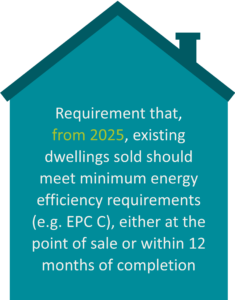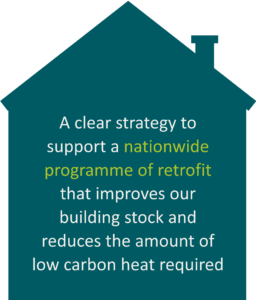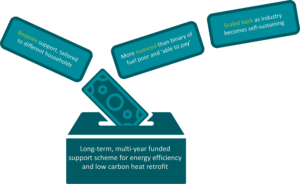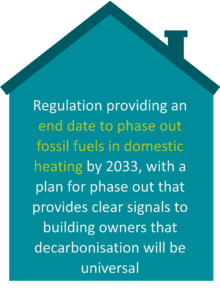The Heat and Buildings Strategy is one of the most important pieces of policy currently being relentlessly ruminated in the government machine. It’s the most vital missing part of the net zero puzzle and we need to start implementing a clear plan for decarbonising heat as soon as possible.
The Strategy itself has been written for several months now, first promised in late 2020, after the publication of the Energy White Paper. Nearly a year later, this absence has not only lost implementation time, but also allowed for rumours to grow and mutate, leaving gaps for debate over contentious proposals and opening doors for lobbying, in all directions.
As we approach the release of the Net Zero Strategy, the Autumn Budget and COP26, and hopefully the Heat and Buildings Strategy, we have pulled together some of the most recent circulating rumours, giving a brief picture of what we might see in the Strategy, as well as what we think must be in it to achieve a concrete, ambitious, workable plan for the decarbonisation of heat and buildings.
We have set out four key pillars that should form this country’s heat strategy, centred around strategic national and local action, regulation, funding and incentives, and local leadership. You can read more about these four pillars here.
These are the areas we’ve heard the most rumours about and that we think are key for a successful Strategy:
-
Energy efficiency and fabric
-
Market distortions, levies and funding
-
End date for fossil fuel boilers
-
Boiler manufacturer mandate
Energy efficiency and fabric
There are several relatively successful schemes focussed on social housing and vulnerable customers that seem set to continue. There are also several green finance initiatives in development.
What are the rumours?
Green Homes Grant (Local Authority Delivery scheme). There are rumours that this will be resurrected, but it’s likely to be only the LAD scheme which was relatively successful compared to the rest of the poorly run scheme.
Social Housing Decarbonisation Fund, Public Sector Decarbonisation Scheme. These schemes are likely to continue, with lots of money promised in the manifesto, but not a lot handed out so far.
Green finance initiatives. Several green lending products have been discussed already and this could be a favoured strategy of the government over grants.
EPC targets. The current commitments to make homes EPC C by 2035 are fairly unambitious and we could see these change.

What do we want to happen?

We believe that the EPC requirements are a great regulatory driver of energy efficiency and the targets for EPC C should be brought forward to 2025. Basing these targets around the sale of a property will also allow a staged implementation, be a crucial trigger point for improving energy efficiency, and more coherently equate value of a property with energy efficiency.

Whilst the individual schemes, rumoured or existing, have had some positive effect, there is still a significant lack of overall strategy to drive retrofit at a national level. Several measures will be needed, including grants schemes, loan schemes, regulatory changes and vastly improved communication of the benefits of a warm home, beyond just the economic and decarbonisation benefits.
Market distortions, levies and funding
A core part of heat policy that seems to be holding up the Strategy is, as always, money. The Treasury seem to be swayed by the Steve Baker & co, ‘climate solutions are expensive’ argument, rather than the ‘climate change will be even more expensive’ no-brainer. Perhaps we will have to wait until the autumn Budget at the end of October and the Strategy itself for clear answers – cutting it very fine with COP26.
What are the rumours?
Electricity/gas green levies: the distortion between green levies on electric vs gas bills has been well documented now and has made its way into the Strategy and onto the Chancellor’s desk. The general agreement seems to be that the current levy distortion on electricity is unfair and should be removed, but the big question is where to move those levies to? In the context of gas price rises and national insurance contribution increases for the less well off, simply moving those levies onto gas bills would be a very difficult sell.
Clean Heat Grant: this proposal has been around for some time and set at £100m, which would fund about 12,000 heat pumps/year for 2 years – far short of the 600,000/year target by 2028. There have been rumours it will be increased to £400m, but this is far from certain and still far from enough.

What do we want to happen?
The costs of decarbonising our heating will be significant, but who the costs fall on is not as black and white as ‘able to pay’ or ‘not able to pay’. Simply moving around green levies or giving those in fuel poverty a grant will not help us to decarbonise in a fair and equitable way. Nor will short term schemes which leave the industry, largely made up of small, local businesses out of pocket or out of a job.
We are calling for a long-term funded support scheme for energy efficiency and low carbon heat retrofit, which must:
- Be long-term and multi-year, avoiding the boom and bust cycles of past initiatives.
- Offer bespoke financial support tailored to different households.
- Offer more nuanced financial support than binary categories of low income, vulnerable groups and the fuel poor, and assuming all others are ‘able to pay’.
- Be scaled back as industry becomes self-sustaining and there is sufficient consumer demand.
We know the principles this funding scheme must meet, but it will likely be a combination of several funding options – grants, loans and longer-term payback reward schemes. A well-considered plan which meets our decarbonisation targets has not yet been proposed in full by the industry – we would be interested in building such a plan, in the event that none is forthcoming in the Strategy.

End date for fossil fuel boilers
What are the rumours?
There has been plenty of dithering about when a ban on gas boilers in existing homes will be set. The CCC has recommended 2033 at the latest, while the IEA has called for a global ban on new fossil fuel boilers by 2025. The government seemed keen on a 2035 ban, then a ban was rumoured to be ruled out, following backbench pressure. Now a ban, if it is put in place at all, could be as late as 2040.
What do we want?

A phase-out date for gas boilers would give homeowners and industry a very strong signal that decarbonisation of heating is happening, and a timeframe in which to prepare. This also allows time for a clear plan to be put in place for the phase out, providing reassurance and certainty. The initial 2040 ban on combustion engine vehicles spurred the industry into action and the date was quickly brought forward incrementally by 10 years, owing to faster than expected growth. We believe a realistic phase out by 2033, accompanied by a clear plan would be achievable. With the typical boiler lifespan of 15 years, any later would leave too many boilers in operation by 2050. As we saw in the EV industry, this target could be brought forward if the industry responds well.
Boiler manufacturer mandate
What are the rumours?
A mandate on boiler manufacturers to sell a portion of low/zero carbon heating solutions has long been on the cards. We had some concerns initially that this would simply be an opportunity for boiler manufacturers to tweak their current boilers to be ‘hydrogen-ready’, but rumours have since surfaced of a mandate to produce heat pumps as well.
Recent BEIS public attitudes tracker responses show that tradespeople (plumber, gas fitter) are second only to the Energy Saving Advice Service as the most trusted to provide advice on heating systems. Boiler manufacturers were also relatively high on that list. If those manufacturers, and consequently installers become advocates of heat pumps, then it provides a significant route to raising awareness and installations in homes.

What do we want?
We support a mandate on manufacturers to produce heat pumps, but it must be technology specific. Simply requiring a certain percentage of ‘low carbon’ production would result in manufacturers producing the cheapest option – hydrogen-ready boilers.
A mandate of this type can however mean a large influx of poor quality products being produced to meet quotas. Any obligation on manufacturers should require that heat pumps are designed and installed to product standards that provide consumer protection, avoiding a similar situation to the poor quality products around at the height of rooftop PV installations.

